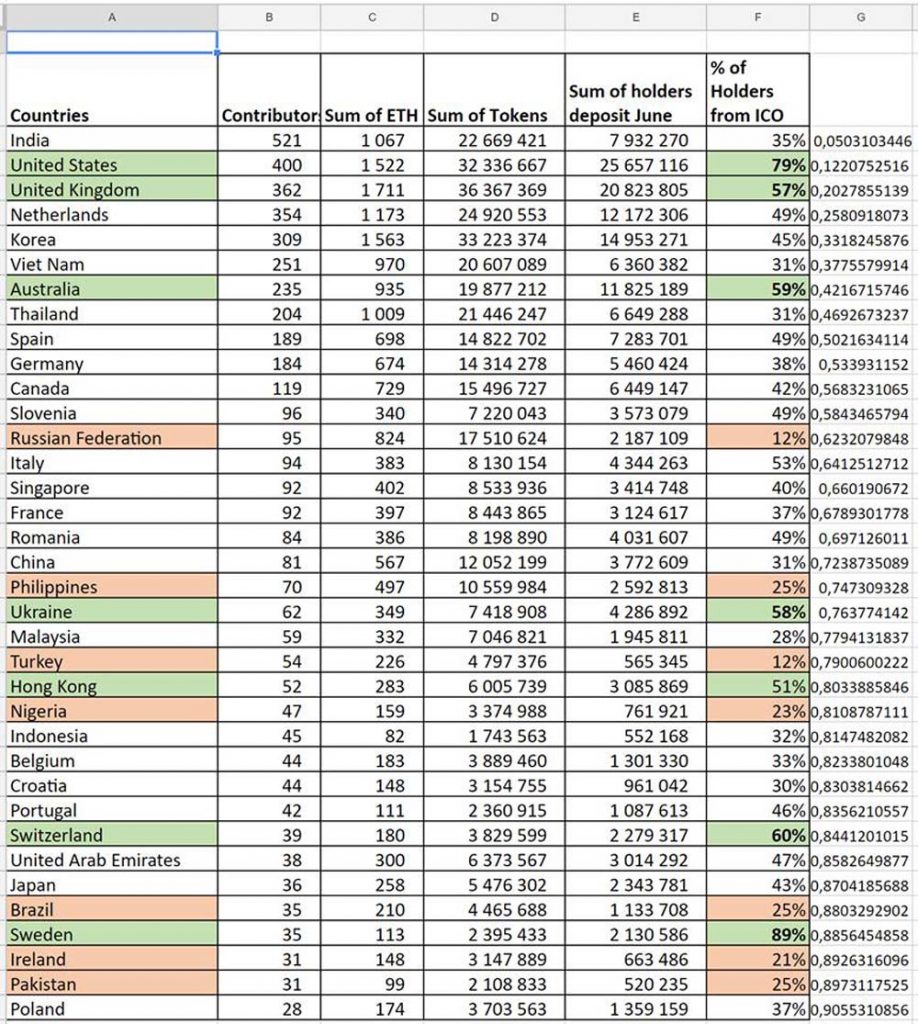The team of a young Ukrainian crypto company has made an effort to collect some interesting data about what happened with their tokens after the sale. It turns out investors from developing countries are inclined to sell the coins within months after their listing, while buyers from developed nations tend to hold them longer.
Also read: No License Needed to Mine Cryptocurrencies in Ukraine
Ukrainian Startup Tracks Its Coins
What happens with your tokens after they are sold and listed on exchanges? That’s a question any decent ICO project should be interested in finding an answer to. Not all teams are so curious, once the coins are dumped on the market, but there are examples of the opposite.
 REMME is a Ukrainian startup building an open source distributed Public Key Infrastructure protocol with a set of Dapps enabling passwordless authentication for users and devices. The company conducted its Initial Coin Offering (ICO) earlier this year and has already raised ~19,343 ETH.
REMME is a Ukrainian startup building an open source distributed Public Key Infrastructure protocol with a set of Dapps enabling passwordless authentication for users and devices. The company conducted its Initial Coin Offering (ICO) earlier this year and has already raised ~19,343 ETH.
During the first two days of the public sale in February only whitelisted candidates were allowed to participate, which helped in gathering the quoted statistics. Investors not registered on the Telegram community whitelist were allowed to join from day three of the offering.
Several months down the road, researchers at REMME have been able to come up with some interesting data regarding the fate of their tokens. Don’t sell to the Russians, is one of the conclusions that can be drawn from their numbers.
US, UK Investors Buy Long, Russians, Nigerians Sell Fast
One of the company’s founders, CEO Alexander Momot, has published on social media some of the tables. It turns out many buyers from developing countries like Brazil, Nigeria, Pakistan, Turkey, and the Philippines, are inclined to sell the acquired tokens within just four months of their listing. Countries like Russia and Ireland are also in the “flipping” group.

On the other hand, investors from developed nations such as the US, the UK, Australia, Hong Kong, Switzerland, and Sweden tend to keep the coins for much longer. The data puts Ukraine in the club of the rich hodlers, which is not surprising given that REMME is a Ukrainian company. Commenting on the findings, the startup’s chief executive said on Facebook:
Since we collected almost the entire amount from the whitelist, we can now monitor the general trends, for example, which countries’ residents are inclined to hold the tokens longer rather than sell them within 4 months after the listing.
Alexander Momot added that “we had all countries open and the country’s indication was mandatory, we can say that such statistics are relevant […] As you have noticed, [investors from] the more developed countries, in general, are more inclined to make long-term investments than [those from] the poorer states.”
 Despite expectations that ICOs would lose steam this year, recently published data suggests it may be too early for that. Although the average sum raised by coin offerings has declined, the total sum of funds collected through ICOs in 2018 has already reached more than 82% of the estimated ~$6.1 billion raised in 2017, as news.Bitcoin.com reported. By the end of May, the mean total raised by almost 800 token sales conducted this year reached almost $6.5 million, compared to $7 million, the mean total raised by close to 900 ICOs last year.
Despite expectations that ICOs would lose steam this year, recently published data suggests it may be too early for that. Although the average sum raised by coin offerings has declined, the total sum of funds collected through ICOs in 2018 has already reached more than 82% of the estimated ~$6.1 billion raised in 2017, as news.Bitcoin.com reported. By the end of May, the mean total raised by almost 800 token sales conducted this year reached almost $6.5 million, compared to $7 million, the mean total raised by close to 900 ICOs last year.
Why do you think investors from developed countries tend to hodl, while those from developing nations prefer flipping? Share your thoughts on the subject in the comments section below.
Images courtesy of Shutterstock, REMME, Alex Momot (Facebook).
Now live, Satoshi Pulse. A comprehensive, real-time listing of the cryptocurrency market. View prices, charts, transaction volumes, and more for the top 500 cryptocurrencies trading today.
The post The Poor Flip, the Rich Hodl, Startup Finds Out Tracing Its Tokens appeared first on Bitcoin News.
Powered by WPeMatico

